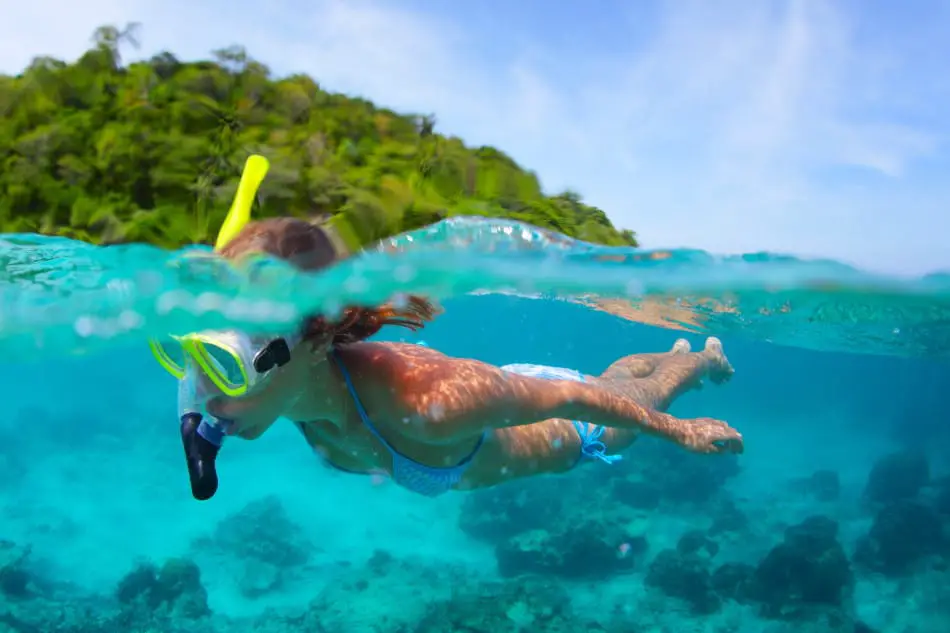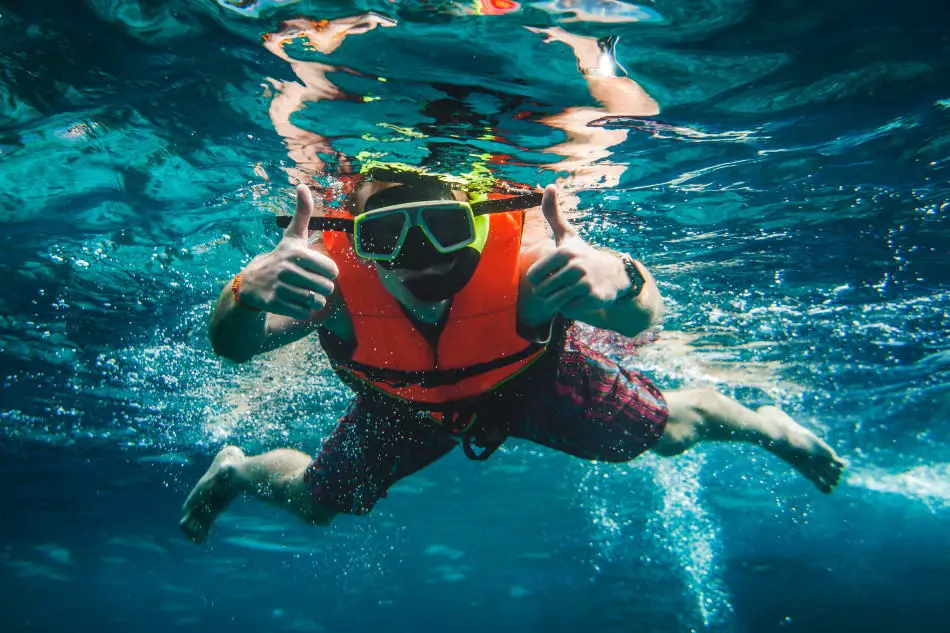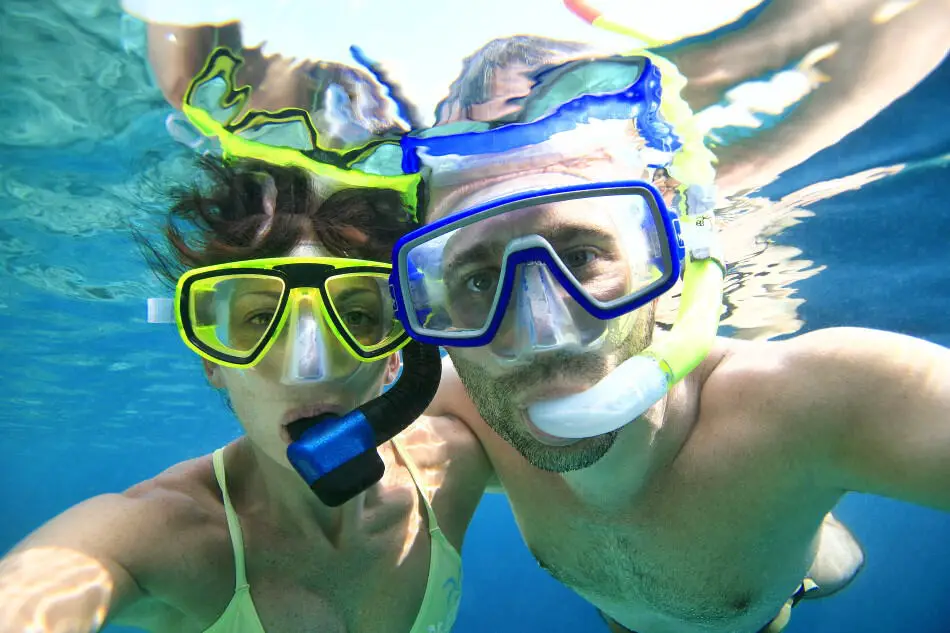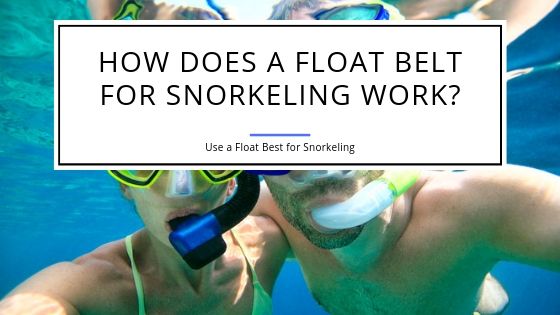How Does a Flotation Belt for Snorkeling Work – Do you need one?
While snorkeling is an activity nearly anyone can enjoy, beginners often waste most of their time and energy flapping their arms and fins just to stay afloat in the water. The truth is that most divers find it difficult to snorkel and, well, not drown, without the presence of a flotation device.
For snorkelers, the use of a float belt for snorkeling can make the experience to see the underwater world a whole lot more enjoyable. So, how does a flotation belt for snorkeling work? Do you need a float belt when you go snorkeling?
For snorkelers still trying to get comfortable with the water and those snorkeling for long periods of time, float belts are a great way to maintain their buoyancy.
What is a Snorkeling Float Belt?
As the name indicates, a snorkeling float belt fulfills the purpose of helping snorkelers (and even swimmers) float in the water without restricting their movement. The floatation belt is worn in the same place as a regular belt and is held in place with the help of a clip or buckle.
Apart from being used by snorkelers-in-training, these floatation belts are also used by older snorkelers. They may also be used while swimming by people with physical disabilities.
Snorkeling floatation belts are made from a variety of materials but usually contain closed-cell foam or EVA foam to keep you afloat in the water. The EVA foam component makes it soft and easy to wear around your waist.
Features of a Flotation Belt
Snorkeling float belts have some basic features that you need to consider before you buy one:
- Size- Apart from making sure that you get the right-sized floatation belt, it is also important that you adjust the snorkeling belt properly so that it fits well without being too tight. The first time you wear a float belt, it will feel a little uncomfortable, but once you get used to it, you won’t even feel its presence.
Most flotation belts for snorkeling come with a size chart, which indicates the waist sizes they’re suitable for. - Material- Most flotation belts consist of an EVA foam attached to a nylon belt. The foam doesn’t absorb water and doesn’t get damaged by chlorine exposure. Some floatation belts for snorkeling have an elastic material, which makes them more comfortable.
Some buoyancy belts are made of inflatable polyester, but they’re not as popular as the foam floatation belts that offer greater support in the water. - Weight Rating- Some floatation belts provide a rating of the maximum body weight they can support. Nearly every snorkeling belt for adults are universal, but the ratings generally differ in children’s belts. Even so, it is ideal to find out the rating of your belt before you purchase it so that it actually helps you stay afloat.
- Fit- It is recommended to use a snorkeling belt that is suitable for any body type so that you’re comfortable in the water. In addition, you should also check whether removing any foam boards from the belt will affect the amount of buoyancy it provides.

Do You Need a Flotation Device for Snorkeling?
Using a float belt while you snorkel will make you feel safe and confident in the water, even if you don’t know how to swim. While it isn’t necessary to use a floatation belt when you snorkel, it is quite important if you plan on snorkeling (or even swimming) for a long period of time.
Can You Snorkel Longer When Using a Float Belt?
Without a snorkeling belt present, snorkelers exert more effort in staying afloat and use up energy faster. Furthermore, without the presence of a snorkeling floatation device, snorkelers may find it difficult to float in a vertical position and may lean forward and alter their movements.
With the flotation belt, snorkelers don’t have to worry about staying afloat and can dispel more energy in moving around and spending more time exploring the ocean.
Not only can you spend much more time in the water, you can venture out further into the ocean and see more sea creatures and corals.
Is a Float Belt Better Than a Snorkel Vest?
While some swimming and snorkeling enthusiasts claim that float belts are the better option, others are in favor of snorkel vests (Best Snorkel Vests). Those who prefer a snorkel vest point out that wearing it on top of their wetsuit causes no drag whatsoever. However, those in favor of the float belt find that once they put it on, they hardly even know it’s there.
If you haven’t used either of them, it is better to try both out in the water. Both will help you stay afloat, but it boils down to whichever one you are more comfortable with as there’s no clear winner for the float belt vs snorkel vest comparison!
Pros of Using a Float Belt
Float belts usually cost less than USD 10 and are very affordable. With proper care, a floatation belt can last for years on end. Simply rinse the belt with water when you’re done and let it dry before storing it and you’re good to go. They’re also really compact and are ideal if you’re traveling with your snorkeling gear.
Some belts also provide support to the torso and keep it from slouching, which in turn keeps your back straight in the water. This can prevent back pains caused due to the wrong posture while snorkeling.

Do Children Need a Flotation Belt When Snorkeling?
There are flotation belts specially designed to be used by children. They can be used to teach children how to swim and snorkel. Not only will the belt keep them afloat, but it will also make them more confident in the water and help them learn faster – Check out here what you need to know when you want to go snorkeling with kids!
However, it is important to remember that flotation belts should only be used by children under adult supervision.
Many parents prefer that their children use a snorkel vest since it provides more protection and comfort. A float belt also keeps snorkelers upright so a child would need to exert more energy to swim forward.
Are Float Belts Useful for Non-Swimmers Who Wish to Snorkel?
Since snorkeling is an activity that is also suitable for non-swimmers, it is highly recommended that such snorkelers wear a float belt when they’re in the water. Flotation belts help you “walk” in the water and glide forward without the fear of going under – Do you need to know how to swim to snorkel?
Do Professionals Use Float Belts?
Float belts aren’t just meant for newbies and non-swimmers. They can also be used by professionals who just wish to:
- Have some extra protection
- Snorkel for longer
- Snorkel in the middle of the ocean without the fear of suddenly getting too tired
Other Flotation Devices
Apart from the float belt and the snorkel vest, there are other devices snorkelers can use to stay afloat in the water:
Life Jacket
Life jackets should only be used when there are absolutely no other options available since they’re quite large and can cause a bit of drag in the water. They are not a popular flotation device among snorkelers.
Pool Noodle
If you’re practicing floating in the water by the shore or in a closed swimming pool, pool noodles can be quite useful. However, since there is the possibility of the pool noodle slipping out from under you, they are preferably not used in the ocean since you need something more reliable to deal with the current.

The Verdict
Overtime, float belts have gained popularity and are a great way to stay afloat while you snorkel. Apart from being compact and comfortable, they’re also great for maintaining the right posture as you snorkel. Snorkeling float belts help you make the most of your time in the water by allowing you to observe life in the ocean without the added concern of maintaining buoyancy.
You can either buy one that fits your particular requirements (size, material, etc.) or rent one from a local dive shop in the area. If you own a float belt, just make sure that you take proper care of it and it’ll become an essential part of your snorkeling gear for many years to come.

